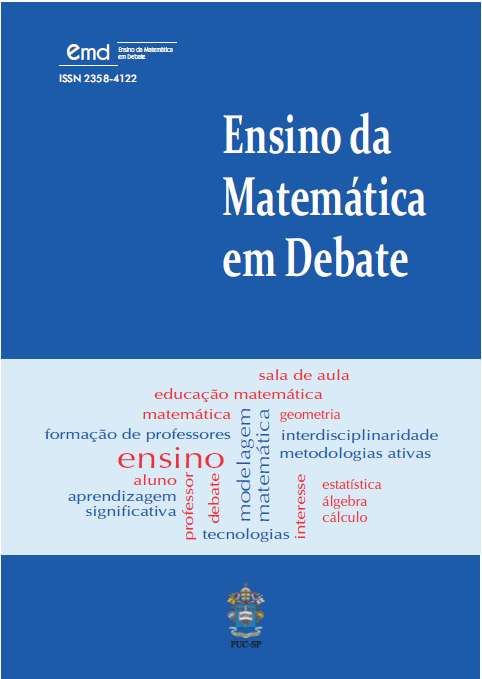APRENDIZAGEM COLABORATIVA ONLINE NA FORMAÇÃO E PRÁTICA DOCENTE
VIVÊNCIAS DA PROGRAMAÇÃO E DO PENSAMENTO COMPUTACIONAL PARA APRENDER MATEMÁTICA USANDO O SCRATCH
Palabras clave:
Formação e prática docente, Programação;, Pensamento computacional, Scratch, Aprendizagem colaborativaResumen
Este artigo tem como objetivo investigar as vivências de quatro estudantes-professores-pesquisadores com o uso da programação articulada com o pensamento computacional para ensinar-aprender matemática na formação e prática docente. Para a produção dos dados foram utilizados os registros da oficina “Juntos, em contextos de aprendizagem colaborativa online, para aprender matemática usando o Scratch” realizada no segundo semestre de 2020, com a duração de 8 horas, e a elaboração de narrativas pelos quatro participantes, sobre o ambiente de programação do Scratch. As atividades partilhadas na oficina desencadearam momentos dialógicos e reflexivos sobre a importância de conhecer teoricamente e na prática diferentes recursos tecnológicos para serem vivenciados em aulas de matemática na educação básica e superior. Cada participante da oficina destacou na sua narrativa que o projeto construído no Scratch será compartilhado nas suas práticas pedagógicas. Com efeito, a oficina propiciou aprendizagem colaborativa online nas ações experienciadas na relação com os pares no ambiente de formação e de prática. Destarte, o ambiente de programação do Scratch é uma ferramenta que pode ser utilizada para colaborar com o processo de ensino-aprendizagem de matemática e outras áreas de conhecimento, numa perspectiva dialógica e problematizadora.
Citas
ALMEIDA, Maria Elizabeth Bianconcini de; VALENTE, José Armando. Pensamento computacional nas políticas e nas práticas em alguns países. Revista Observatório, Palmas, v. 5, n. 1, p. 202-242, jan./mar. 2019. ISSN 2447-4266. DOI 10.20873/uft.2447-4266.2019v5n1p202. Disponível em: https://sistemas.uft.edu.br/periodicos/index.php/observatorio/article/view/4742. Acesso em: 28 ago. 2020.
AZEVEDO, Greiton Toledo de; MALTEMPI, Marcus Vinicius. Processo de aprendizagem de matemática à luz das metodologias ativas e do pensamento computacional. Ciência & Educação, Bauru, v. 26, e20061, p. 1-18, 2020. ISSN 1980-850X. DOI 10.1590/1516-731320200061. Disponível em: https://www.scielo.br/pdf/ciedu/v26/1516-7313-ciedu-26-e20061.pdf. Acesso em: 26 nov. 2020.
BITTENCOURT, Carla Simone; GRASSI, Daiane; ARUSIEVICZ, Fernanda; TONIDANDEL, Iara. Aprendizagem colaborativa apoiada por computador. Revista Novas Tecnologias na Educação, Porto Alegre, v. 2, n. 1, p. 1-5, mar. 2004. ISSN 1679-1916. Disponível em: https://seer.ufrgs.br/renote/article/view/13657/7945. Acesso em: 23 nov. 2020.
BOLÍVAR, Antonio; DOMINGO, Jesús; FERNÁNDEZ, Manuel. La investigación biográfico-narrativa en educación: enfoque y metodología. Madri: Editorial La Muralla, 2001.
BRASIL. Base Nacional Comum Curricular (BNCC): Educação Infantil, Ensino Fundamental e Ensino Médio. Brasília: MEC/SEB, 2018.
CLANDININ, D. Jean; CONNELLY, F. Michael. Pesquisa narrativa: experiência e história na pesquisa qualitativa. Tradução do Grupo de Pesquisa Narrativa e Educação de Professores (GPNEP) ILEEL/UFU. 2. ed. rev. Uberlândia: EDUFU, 2015.
ENGELBRECHT, Johann; BORBA, Marcelo de Carvalho; LLINARES, Salvador; KAISER, Gabriele. Will 2020 be remembered as the year in which education was changed? ZDM Mathematics Education 52, p. 821–824, 2020. DOI 10.1007/s11858-020-01185-3. Disponível em: https://link.springer.com/article/10.1007/s11858-020-01185-3.
Acesso em: 19 ago. 2020.
ENGELBRECHT, Johann; LLINARES, Salvador; BORBA, Marcelo de Carvalho Transformation of the mathematics classroom with the internet. ZDM Mathematics Education 52, p. 825–841, 2020. DOI 10.1007/s11858-020-01176-4. Disponível em: https://link.springer.com/article/10.1007/s11858-020-01176-4. Acesso em: 19 ago. 2020.
FERNANDES, Natal Lânia Roque; REALI, Aline Maria de Medeiros Rodrigues. Professores e informática na educação: conhecimentos e saberes em uma experiência de aprender a ensinar. In: MIZUKAMI, Maria da Graça Nicoletti; REALI, Aline Maria de Medeiros Rodrigues (org.). Processos formativos da docência: conteúdos e práticas. São Carlos: EdUFSCar, 2005. p. 75-97.
FIORENTINI, Dario. Pesquisar práticas colaborativas ou pesquisar colaborativamente? In: BORBA, Marcelo de Carvalho; ARAÚJO, Jussara de Loiola (org.). Pesquisa qualitativa em educação matemática. 2. ed. Belo Horizonte: Autêntica, 2006. p. 49-78.
FREIRE, Paulo. Pedagogia da autonomia: saberes necessários à prática educativa. 18. ed. São Paulo: Paz e Terra, 1996.
FREIRE, Paulo. À sombra desta mangueira. 4. ed. São Paulo: Olho d’Água, 2001.
FREIRE, Paulo. Professora sim, tia não: cartas a quem ousa ensinar. 12. ed. São Paulo: Olho d’Água, 2002.
LARROSA, Jorge. Notas sobre a experiência e o saber de experiência. Tradução de João Wanderley Geraldi. Revista Brasileira de Educação, Rio de Janeiro, n. 19, p. 20-28, jan./fev./mar./abr. 2002.
MISKULIN, Rosana Giaretta Sguerra. Mito seis: es sólo para ciertos temas. In: LÓPEZ,
Gustavo Adolfo Villegas; BRAVO, Marta Lucía Restrepo (org.). Diez mitos sobre la educación virtual: una mirada intercultural. Medellín: Fondo Editorial Universidad EAFIT, 2012. p. 101-124.
ROCHA, Ana Karina de Oliveira; PRADO, Maria Elisabette Brisola Brito; VALENTE, José Armando. A linguagem de programação Scratch na formação do professor: uma abordagem baseada no Tpack. Revista Sergipana de Matemática e Educação Matemática, Sergipe, v. 5, n. 2, p. 19-36, 2020. ISSN 2525-5444. DOI 10.34179/revisem.v5i2.14421.
Disponível em: https://seer.ufs.br/index.php/ReviSe/article/view/14421. Acesso em: 24 nov. 2020.
RODEGHIERO, Carolina Campos; SPEROTTO, Rosária Ilgenfritz; ÁVILA, Christiano Martino Otero. Aprendizagem criativa e Scratch: possibilidades metodológicas de inovação no ensino superior. Momento: Diálogos em Educação, Rio Grande, RS, v. 27, n. 1, p. 188-206, jan./abril. 2018. ISSN 2316-3100. DOI 10.14295/momento.v27i1.7806. Disponível em: https://periodicos.furg.br/momento/article/view/7806. Acesso em: 26 nov. 2020.
SALGADO, Nilmara; CASTRO, Thaís; CASTRO, Alberto. Aprendizagem colaborativa de programação com Scratch e OpenSimulator. SBSC 2013 PROCEEDINGS - FULL PAPER, 2013, Manaus. p. 104-111.
SÁPIRAS, Fernanda Schuck; VECCHIA, Rodrigo Dalla; MALTEMPI, Marcus Vinicius. Utilização do Scratch em sala de aula. Educação Matemática Pesquisa, São Paulo, v. 17, n. 5, p. 973- 988, 2015. ISSN 1983-3156. Disponível em: https://revistas.pucsp.br/index.php/emp/article/view/25152. Acesso em: 27 nov. 2020.
VALENTE, José Armando. Integração do pensamento computacional no currículo da educação básica: diferentes estratégias usadas e questões de formação de professores e avaliação do aluno. Revista e-Curriculum, São Paulo, v. 14, n. 3, p. 864-897 jul./set. 2016. ISSN 1809-3876. Disponível em: http://revistas.pucsp.br/index.php/curriculum. Acesso em: 29 ago. 2020.
WENGER, Étienne. Comunidades de práctica: aprendizaje, significado e identidade. Barcelona, Buenos Aires e México: Paidós, 2001.
Descargas
Publicado
Cómo citar
Número
Sección
Licencia
Derechos de autor 2022 Ensino da Matemática em Debate

Esta obra está bajo una licencia internacional Creative Commons Atribución-NoComercial 4.0.

Este obra está licenciado com uma Licença Creative Commons Atribuição 4.0 Internacional.





